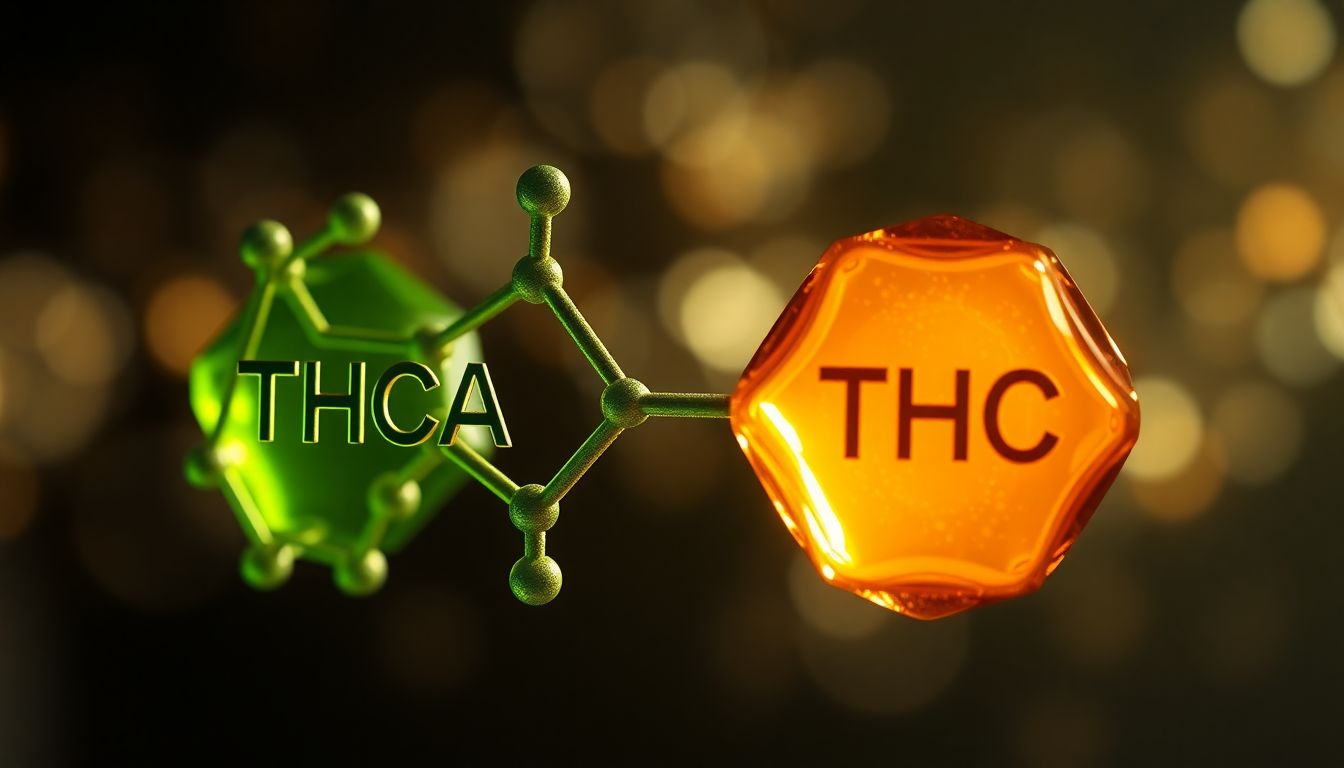THCA vs. THC What's the Difference?
Posted by Hemp World 420 on Mar 25th 2025

THCA vs. THC: Unlocking the Secrets of Cannabis Compounds
Did you know cannabis sales hit nearly $30 billion in 2023? The industry is booming! Two compounds, THCA and THC, are at the center of it all. But what's the real deal? This guide clarifies the key differences between THCA and THC. We'll cover their effects and legal status.
What is THCA?
THCA is a fascinating compound. Many people are curious about its effects. Let's take a closer look.
THCA Definition and Molecular Structure
THCA stands for tetrahydrocannabinolic acid. It's a non-psychoactive cannabinoid found in raw cannabis. Its molecular structure is very similar to THC. The main difference? THCA has an extra carboxyl group (COOH). This tiny difference changes a lot.
How THCA is Formed in the Cannabis Plant
THCA comes from cannabigerolic acid (CBGA). Think of CBGA as the "stem cell" of cannabinoids. Enzymes in the plant transform CBGA into THCA. This is part of the plant's natural growth. Without these enzymes, there'd be no THCA!
The Non-Psychoactive Nature of THCA
THCA won't get you high. Why not? It doesn't bind well to CB1 receptors in your brain. These receptors are part of the endocannabinoid system. THCA's molecular shape prevents it from fitting properly. So, no psychoactive effects occur.
What is THC?
THC is well-known in the cannabis world. Many seek it for its unique effects. Let's explore what makes THC special.
THC Definition and Molecular Structure
THC is short for tetrahydrocannabinol. It's the main psychoactive compound in cannabis. Its molecular structure is similar to THCA. However, it lacks that carboxyl group. This missing piece is what makes all the difference.
The Psychoactive Effects of THC
THC can alter your state of mind. It interacts directly with your brain's CB1 receptors. This leads to feelings of euphoria and relaxation. Some people may experience altered perceptions. The intensity varies by person and dosage.
Different Forms of THC: Delta 9 vs. Delta 8
You may have heard of Delta 9 and Delta 8 THC. These are different forms of the same molecule. Delta 9 is more common and potent. Delta 8 offers milder effects. The location of a double bond on the carbon chain is different. That shift changes their strength.
THCA vs. THC: Key Differences Explained
THCA and THC are related but different. Understanding their distinctions is crucial. Let's break down the key factors.
Chemical Structure and Properties
Look at THCA and THC side by side. Notice the carboxyl group on THCA. THC lacks this group. This small chemical difference results in big changes. The presence or absence of this group affects how each compound interacts with your body.
Psychoactive vs. Non-Psychoactive Effects
THCA won't get you high. THC will. This is the most important difference. Decarboxylation is the process that converts THCA into THC. Heat removes the carboxyl group.
Methods of Consumption and Their Effects
How you consume cannabis matters. Smoking or vaping heats THCA, turning it into THC. Edibles work differently. The THCA converts during baking. The THC then passes through your digestive system. This affects how quickly and strongly you feel the effects. Bioavailability differs depending on the route.
Potential Benefits and Uses
Both THCA and THC may offer unique benefits. Research is ongoing. Here's what we know so far.
Potential Benefits of THCA
THCA may have anti-inflammatory properties. Some studies suggest it could be neuroprotective. It could also help reduce nausea. More research is needed to confirm these benefits. But early results are promising.
Potential Benefits of THC
THC is known for pain relief. It can stimulate appetite and elevate mood. Research supports these effects. THC interacts with pain pathways in the brain. It also affects areas that control hunger and emotions.
How to Use THCA and THC Products
Start with low doses. See how your body reacts. If smoking, inhale slowly. When using edibles, be patient. Effects can take one to two hours to kick in. Always consult with a healthcare professional.
Legality and Regulations
The legal status of THCA and THC is complex. Laws vary. Staying informed is essential.
Federal vs. State Laws
Federal law still considers marijuana illegal. State laws differ widely. Some states have legalized recreational and medical use. Others have strict restrictions. THCA derived from hemp may be treated differently.
The Impact of the 2018 Farm Bill
The 2018 Farm Bill legalized hemp. Hemp is defined as cannabis with less than 0.3% Delta 9 THC. This bill opened a legal market for hemp-derived products. Some argue that THCA falls into a legal gray area if derived from hemp.
Purchasing and Possessing THCA and THC
Purchase products from licensed retailers. Check your local laws. Know the possession limits. Some states have restrictions based on THC content. Always be aware of the regulations in your area.
Conclusion
THCA and THC are distinct compounds with different properties. THCA is non-psychoactive in its raw form. THC offers psychoactive effects. Understanding these differences is crucial for informed choices. Stay updated on cannabis research and regulations. This knowledge helps you navigate the ever-changing cannabis landscape.
